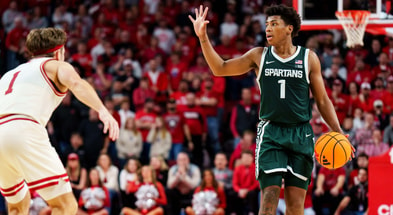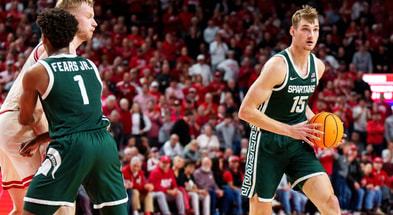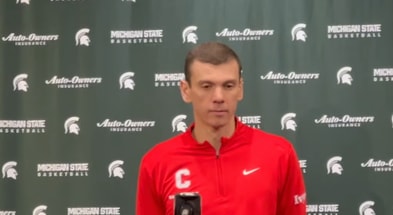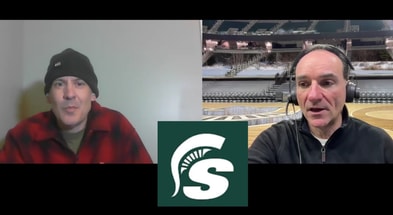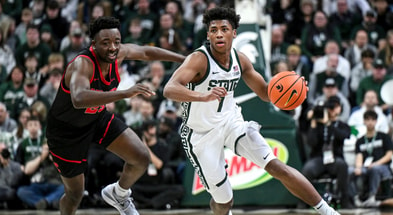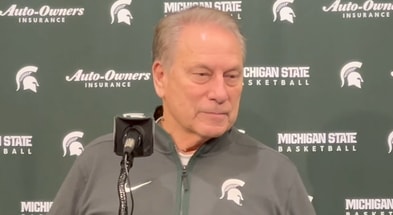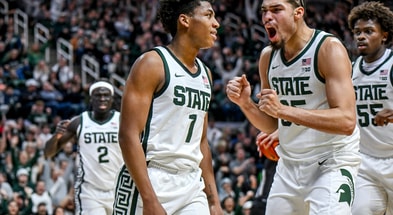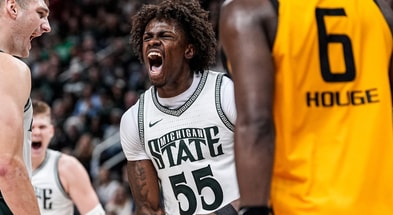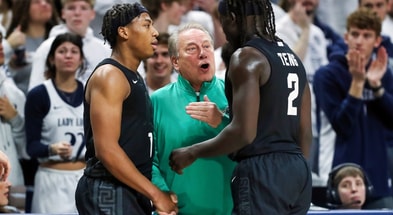Michigan State's Mady Sissoko uses NIL money to open school in Mali
East Lansing, Mich. – Mady Sissoko’s dream of serving his native community has been realized. Last month, the Michigan State center returned to his home country of Mali for the grand opening of the Mady Sissoko Foundation School, a building he and countless others helped raise money to construct.
The idea to build the school originated before the 2022-23 Michigan State basketball season. Sissoko isn’t allowed to use the money he earns from name, image and likeness (NIL) opportunities due to student visa rules. According to the United States visa policy, those with an F-1 student visa are largely prohibited from earning income through off-campus work while in America.
So, Sissoko, his guardian Michael Clayton and other friends and family members from his host city of Mount Pleasant, Utah, decided to use Sissoko’s NIL money for good. Sissoko also established the Mady Sissoko Foundation to help raise money for the cause. Thanks to the contributions of countless Michigan State community members, Sissoko exceeded his goal of $50,000.
That money, plus all of Sissoko’s NIL funds, went to the new school, a well and sports equipment for the people in Sissoko’s village in Bafoulabé, a rural town in the southwestern part of the country.
Construction on the school began in February on a piece of land donated by Sissoko’s father. By May 11, Sissoko was able to return home and celebrate his accomplishments with his family and friends.
“It went well, to be honest,” Sissoko said. “The way it went, it was so fast. There was never anything (like that) that happened there before. People were so happy about it. We did it in six months. To do a building like that over there, it would probably take a year. But we did it in six months because of the MSU community. They (mean so much) to me now because of the way they helped me and went through this process. It was amazing.
“Everything is finished, we just have to set up the desks and give out some materials for the students and stuff. It was amazing, man. I think it’s something that everybody over there is just so happy (about). They couldn’t believe what was happening.”
Sissoko has only been able to return to Mali twice since arriving at Michigan State in 2020. Folks from home and those working on the school building sent him photos of the construction as progress was made.
When he finally got to see the finished product in person, though, Sissoko was overcome with emotion.
“I’m not a big crying guy, but I almost did, to be honest, because I thought it was just going to be a ‘my village’ thing,” Sissoko said. “But the rest of the village, the closer villages, everybody came to just celebrate with us. It almost felt like it was magical. Everybody came to support.
“To do that over there is a very big deal. It’s absolutely the best thing you could do for them.”
Sissoko was accompanied by his host family from Utah on the two-week trip to his village. When he arrived, he was met with immediate attention.
“I hate talking about myself, but when I was there, it definitely felt like I was the mayor,” Sissoko said with a smile. “And the mayor was there, too, but everybody was just coming to me. It was the craziest thing I’ve ever been around. To do something in the village like this, people will always appreciate it. One thing I told them is to just make sure your kids go to school because people put a lot of work into this and we have to make sure kids go to school.
“We also did the water thing when we were there, so when the first water came out (of the well), everybody was like, ‘No way.’ It was a crazy moment.”
Sissoko reconnected with loved ones during his visit to Mali and educated them on the game of basketball, a sport not nearly as popular as soccer is in his village.
“I showed them a lot of videos and a lot of pictures,” Sissoko said. “Mostly, they were just amazed by how my body’s changed, how I look now, how my hair has changed. I showed them some stuff and they have questions about everything because they have no idea about basketball. When I talk to them about March Madness, they’re like, ‘What’s that?’
“I just explained to them some stuff and they were like, ‘We’re praying for you, keep going. Don’t let us down.’ I said, ‘I won’t.’”
Top 10
- 1New
Kewan Lacy
Rebels RB decides on future
- 2Hot
Nebraska QB dominoes
Huskers line up multiple visits
- 3
Kenny Minchey
Flips transfer commitment
- 4Trending
Portal Predictions
Predicting transfer commitments
- 5
Bryce Underwood
Decides on Michigan future
Get the Daily On3 Newsletter in your inbox every morning
By clicking "Subscribe to Newsletter", I agree to On3's Privacy Notice, Terms, and use of my personal information described therein.
Sissoko’s village is small and relatively remote. It has about 900-1,000 residents and is roughly one and a half hours from the nearest city. For the folks who live there, access to a new well in their village means less travel, less work and a lesser chance of getting sick.
It also means more time to attend school and play on their new basketball court.
“The mission is to give (kids) a chance,” Sissoko said. “There are a lot of smart people in the village, but they don’t have a lot of chances because they’re far from the school. To wake up every single day and walk for an hour and have to go to school, even if you like the school, that’s going to discourage you some days. Now you have a school right there. You can wake up, brush your teeth, eat breakfast and just walk five minutes to go to school.”
Sissoko’s own experiences inspired him to donate his NIL funds to this cause. Back when he lived in Mali, Sissoko would walk up to an hour and a half to school, sometimes barefoot. Functioning bicycles were a rarity thanks to the damage they’d endure from the poor road conditions.
Sissoko said that attending a school like the one he helped build – one with electricity and rooms that hold nearly 60 students each – “would’ve meant everything to (him)” when he was a kid.
“My old friends over there – the people I went to school with – they were like, ‘Wow, I wish we had a school here like that at that time,’” Sissoko said. “I’m like, ‘Everything has timing. Whatever you do, there’s timing. It’s going to extend and get better and get better now. What we went through, we can’t change that. But we have to make sure a kid or our little brothers have a different perspective than we did.”
The school has four primary classrooms, but Sissoko hopes that expansion is on the way given the large number of kids who are in need of an education. Most of the students are eight to 15 years old.
Sissoko arrived in America as a 15-year-old who knew little English. As soon as he left Mali, he established a goal of giving back to his village.
“That’s something that came to my head right away (after leaving Mali),” Sissoko said. “I want to do something for my people. I have family there still, I have friends there still. They all wish they could have this kind of opportunity.
“They also motivated me to do the things that I do here (at Michigan State), and for that I am appreciative and I will give back.”
Sissoko may have accomplished a lot already, but his goals don’t end here.
“Doing this, it just motivates me so much because there’s more stuff that’s lined up that I want to do back there,” Sissoko said. “The first one (building the school) is the hardest thing to do. You do the first one and then you do the second one. The first one is going to help motivate you and get another one. It motivates me every single day, what I do here, what I’m willing to give back. It motivates me every single day to do that.
“To get this little chance and to give back to them — my village was down here, but now it’s on the map and everybody knows about it.”






